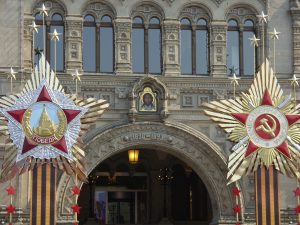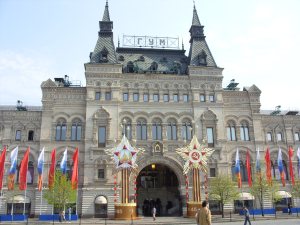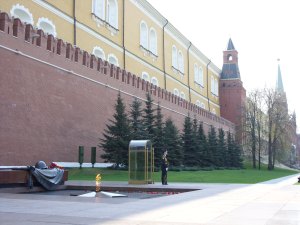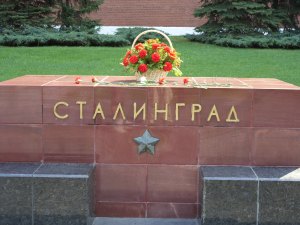Three pairs of eyes glowered at me through the round windows of their gas masks as the nearest car rolled past. The horizontal red, white and blue bars of the Russian tricolour fluttered from the windows of the other vehicles in the formation. As we spun around to stare after them, the Soviet Union’s ‘Victory Banner’, a gold star emblazoned on a field of red, fluttered behind the backmarker, which also had the word ‘partizan’ scrawled in cyrillic on the back window. It was 9 May, and the Victory Day celebrations commemorating the USSR’s 1945 capture of the burnt-out shell of Berlin’s Reichstag were in full swing. As the sun went down, the celebrations showed no signs of letting up, and as a foreigner on the streets of the central Siberian town of Tyumen, I decided it was time to lie low.
All this happened back in 2009, long before the Ukraine became the flashpoint of a new Cold War and Russia comfortably slipped back into its traditional role of world bogeyman in western media. But already there were signs of the nationalistic pride of a former superpower bubbling beneath the surface.

Earlier in the trip, we had stumbled across rehearsals for the huge Moscow Victory Day celebrations. At the time, I marvelled at how far East-West relations had come that I could stand in Red Square and watch the parade of Russian military hardware roll past the mausoleum in which Lenin’s embalmed body still lies in state. From the perspective of 2015, this seems very misguided.
However, the threatening atmosphere of that day in Tyumen was the exception. Throughout my trip across Russia, from Bristol to China on the Trans-Siberian railway, I was overwhelmingly struck by the friendliness and hospitality I received. Upon first arrival, it did not seem like it was going to be that way: the greeting from the customs officials at the Belorussian border was hardly welcoming. In the bustle of Moscow’s station, a smile was rarely in evidence, and approaching a local for directions generally led to them backing away as soon as the first English word had left your lips.

But whenever you spent more than a fleeting moment together, sharing a train compartment being a perfect example, the real warmth of the Russian welcome shone through. Out of Moscow, we shared a delicious meal in the restaurant carriage with a trainee lawyer. As the Baltika beer flowed, he wouldn’t let us pay a rouble. When someone produced a guitar, they sang us a song from the Afghan War so moving that they were made to stop by the ‘provodnitsa’ in charge of the carriage, and our friend had to look up the word for ‘censored’ in our dictionary. When the guitar inevitably found its way into our reluctant hands there was a nervous moment before someone asked, ‘errr…does everyone know Tenacious D?’ Once we’d hummed and trilled our way through comedian Jack Black’s ‘The Greatest Song in the World’, I was relieved to find that the bemused look on our new friends’ faces didn’t dampen the atmosphere any.
I spent a bizarre day in Yekaterinburg with a Spetsnaz soldier, fresh out of Chechnya, and his friends. He had a guitar but couldn’t play it, and they claimed to be a band but didn’t have any instruments. He wandered about town in his fatigues drinking vodka, at one stage taking time out to shout at a passing bride and groom. They, however, didn’t seem to mind and greeted him with a smile and a wave.
On a later leg of the journey, a passenger tapped me on the shoulder and handed me his mobile phone. Not speaking english himself, he had called an english-speaking friend in order to get an introduction. We spent the next few hours having those fail-safe male conversations that apply the world over: football, beer, football, girls, and football, even if the language barrier meant that the ‘conversation’ was largely limited to naming examples of each. Returning to our compartment, our bunk-mate insisted on giving us his Ural rock collection, pretty much the last thing I wanted to haul another 5,000 miles across two continents.

But that day in Tyumen was different. I had started the day in Tobolsk, a formerly grand Tsarist capital of Siberia, where the Romanovs were initially exiled. Marooned away from the lifeline of the railway, the town is not what it once was, and it is filled with huge Orthodox cathedrals and rotting wooden buildings. Celebrations were small-scale locally, with a small parade boasting a solitary tank and a band. A far cry from the celebrations that must have been going on in Moscow.

Later that day, I travelled back to the Trans-Sib mainline city of Tyumen and it was clear fairly quickly that most people had been celebrating the holiday with vodka. In the early afternoon, there was a party mood, with many families out and about enjoying the atmosphere. The day celebrates the victory of the USSR in a cataclysmic war that by some estimates cost the lives of 28 million Soviet citizens, and inspires huge national pride. The Soviet Union was a multi-cultural, secular empire, and during the day the occasional car passed flying the flag of a former constituent part of it.
But by late afternoon, these had been replaced by fleets of cars speeding through the wide streets in formation, and the only flag visible was the Russian red, white and blue. Initially, the car formations were full of mixed groups of young people, but as the day wore on the occupants seemed to be all-male, culminating in our gas mask-sporting friends and a very intimidating atmosphere.
Sometimes on the road, you have to recognise when to take yourself out of a threatening situation, and at that point we made a beeline back to the station to hide out until our train later that night. On the way, we tried to keep off the main streets, avoiding the angry groups of men congregating on street corners under the watchful eyes of the police. This was one of the few times I have felt threatened while travelling, but for all the good things about Russia, I’d go back in a heartbeat.
